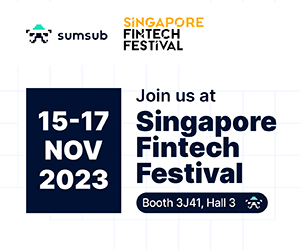Singapore has big plans for its national QR code payment standard. The country wants to establish its Singapore Quick Response Code (SGQR) as a top mobile payment method at physical stores, and is pursuing linkage opportunities with other national QR code payment schemes in Asia Pacific (APAC).
Introduced in September 2018, SGQR is a standard for a unified payment QR code, allowing multiple payment schemes to be combined into a single SGQR label. In practice, this means that a merchant simply needs to display one QR payment code which would then be usable by the customer across a variety of digital wallets and payment apps. Ultimately, this means greater interoperability across mobile payment services, lesser fragmentation, and potentially, greater adoption of mobile and digital payments.
Screengrab SGQR presentation video, Source: MAS
Since its launch, adoption of SGQR has been strong, with most merchants (more than 203,000) in Singapore now accepting digital payments via SGQR, according the Monetary Authority of Singapore (MAS) and the Infocomm Media Development Authority (IMDA), a statutory board of the Singapore government tasked with driving the country’s digital transformation with infocomm media.
Aiming for greater acceptance across the whole payments value chain, the authorities are proposing a set of guidelines intended to increase participation of merchants acquirers and payment schemes in SGQR.
The guidelines would make any relevant merchant acquirer a de facto SGQR member. These companies would be required to provide the relevant merchant acquisition service by way of an SGQR label only.
Currently, a total of 31 banks and merchant acquirers support SGQR, though data from MAS’ website indicate that 34 licensed Major Payment Institutions (excluding banks) are providing merchants with the means to accept and process payment transactions. The figures suggest a significant gap. Prominent merchant acquirers that have yet to support SGQR include, for example, Adyen, Airwallex and Checkout.com.
MAS and IMDA are also proposing a fee structure model to help SGQR become a self-sustaining national payment electronic payments infrastructure in the long run. The proposal includes a one-time onboarding fee of S$1,800, an annual account maintenance fee of S$360, and a tiered annual subscription fee that depends on the total number of SGQR labels issued by the SGQR member at the end of the calendar year. A proposal for the Banking Computer Services (BCS) to perform a one-time fee collection to recover costs of operating the Central Repository has also been made.
MAS and IMDA initiated a consultation period on September 27, 2022, welcoming the public to share their views on the proposals. The consultation will close at 11:59pm on October 28, 2022.
Cross-border linkage
Besides the proposals to help boost acceptance of SGQR and enable the system to become financially viable, the consultation paper also gives a glimpse at what Singapore has in mind for its national payment QR standard in the long term.
In particular, the paper shares ambitions for SGQR to link with other national QR code payment schemes in the region to support cross-border QR code payments to merchants. Ultimately, the goal would be to allow businesses in Singapore to accept payments from a broader range of schemes for their customers overseas. For Singapore consumers, this would enable for more seamless payments to foreign merchants and would allow them to use payment methods they are already accustomed to.
In APAC, countries including China, India, Indonesia, Malaysia, Philippines, and Thailand have developed their own national QR code payment schemes, and linkages are already complete for some of them. For example, Malaysia, Indonesia and Thailand are connected with one another. Thailand is also linked to Japan, Cambodia, Vietnam and Singapore. Singapore is started working on a cross-border QR payment linkage with Indonesia in August 2022.
Featured image credit: edited from Unsplash
- ant financial
- blockchain
- blockchain conference fintech
- chime fintech
- coinbase
- coingenius
- crypto conference fintech
- fintech
- fintech app
- fintech innovation
- Fintechnews Singapore
- mobile payments
- OpenSea
- PayPal
- paytech
- payway
- plato
- plato ai
- Plato Data Intelligence
- PlatoData
- platogaming
- QR code payments
- razorpay
- Revolut
- Ripple
- Singapore
- Singapore Quick Response Code (SGQR)
- square fintech
- stripe
- tencent fintech
- xero
- zephyrnet














